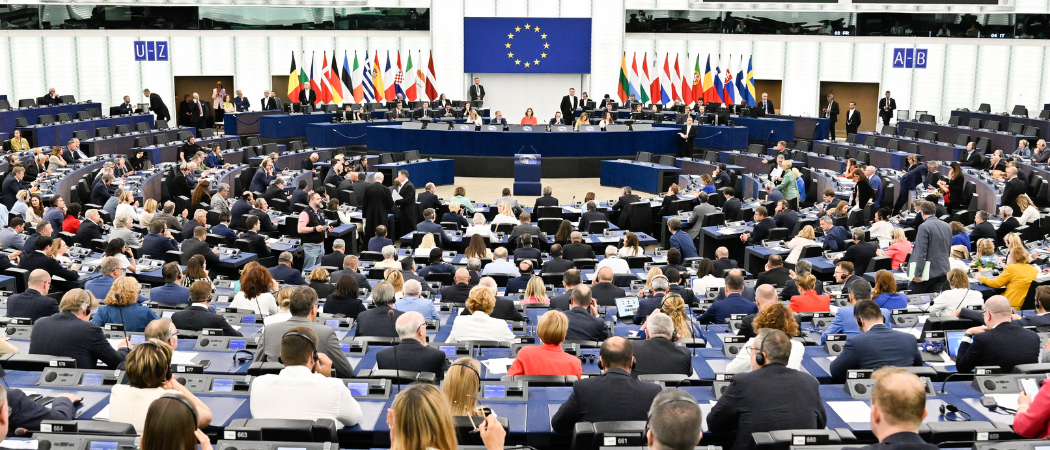Parliamentarians have been reacting to the new lineup. There’s a big focus on technology, innovation and industry, but it’s scattered across the team

European Parliament's Plenary session. Photo credits: Philippe Stirnweiss / European Union
As the dust settles on the new commission unveiled by returning European Commission president Ursula von der Leyen on Tuesday, research and innovation-focused MEPs have been reacting – and they are worried that the portfolio risks being spread too thinly.
Four of the six executive vice presidents have education, science or technology responsibilities in their mission letters. And in addition to the commissioner for start-ups, research and innovation, Bulgarian Ekaterina Zaharieva, three other commissioners in health, climate and defence also have research and innovation in their mandates.
Earlier this week, von der Leyen acknowledged that the new college of commissioners would have to coordinate like never before, with no more “rigid stovepipes” of authority.
“Because what affects security affects democracy, what affects the economy affects society, and what affects climate and environment, also affects people and business,” she said.
On the one hand, the overall strong focus on areas like innovation and industry could be a good thing, said Bruno Tobback MEP, a member of the Parliament’s industry, research and energy committee (ITRE), and a former Belgian environment minister.
But there’s also the risk of overlap. “One of the key messages of the Draghi report was coherence and coordination, and it’s the same for innovation and scientific research – it’s all very scattered, and we need to ensure the next Commission is very focused in what they do,” he said, referring to a major competitiveness report released by the former Italian prime minister last week.
Research commissioner Zaharieva, for example, will chiefly report to Stéphane Séjourné, the French executive vice president for prosperity and industrial strategy, but on matters of technological sovereignty, is answerable to Henna Virkkunen, the Finnish executive vice president in charge of that area. This could lead to better cross-college coordination – or confusion.
“Make sure that you coordinate,” said Stine Bosse, an incoming Danish MEP with a background in international companies, told the new commission. Businesses had complained about disjoined policy during the outgoing commission, she added.
The new commission also has a renewed focus on business competitiveness, as fears of European economic decline have intensified. “The whole college is committed to competitiveness,” von der Leyen said on Tuesday. But as with research and innovation, this portfolio is also highly spread out.
“The fragmentation of the competitiveness portfolio among multiple executive vice presidents will make effective coordination and strategic steering more difficult than necessary,” echoed Christian Ehler, a German MEP who was rapporteur for the Horizon Europe research and innovation programme.
‘Lightweight’
Ehler also dismissed the new industrial policy chief Séjourné as a “lightweight”.
“His experience is mainly political and is very light on experience in industry. He seems to have more experience in socialist student movements than in developing effective policies for industrial competitiveness,” he said.
Bosse, meanwhile, welcomed recent comments by the Spanish executive vice president Teresa Ribera, who has the powerful competition brief, that she could relax rules on mergers to allow European companies to scale up to become global heavyweights.
“This is exactly right,” said Bosse. “Companies in Europe get to a certain size, then they don’t get further.”
‘Administrative take-over’
Ehler also sounded the alarm over a mooted EU Competitiveness Fund mentioned in the new commissioners’ mission letters.
Some in the research world fear that parts of the Commission, particularly the budget directorate, are plotting to consolidate the successor to Horizon Europe into the fund, come the next EU budget cycle starting in 2028.
“The Competitiveness Fund reads a lot like the administrative take-over of Union funds that was rumoured to be the wish of some Commission officials,” said Ehler.
“This would have nothing to do with the needs of our industry and would undermine important union programmes like Connecting Europe Facility and the Framework Programme for research,” he added.
The Draghi report had already stressed that European research funding should be “taken out of the hands of bureaucrats and into the hands of experts”, he said, but “integrating research and innovation in the Competitiveness Fund would do the opposite and this cannot be accepted by the Parliament.”
Grilled by MEPs
The new commissioners must still be approved by parliament, and this gives MEPs a chance to grill them on their priorities, although it’s not clear when this will happen. MEPs could have to wait until December to have their chance.
Bosse said her chief question for research commissioner Zaharieva – who, for the first time, also has start-ups in the portfolio – would be how she “strikes a balance” between accelerating start-up growth and preserving Europe’s worker and environment protections.
She said she would also push Zaharieva on why most of the Horizon Europe programme is spent on research grants rather than investing in equity for companies. “I find it funny that it’s all grant money,” she said.
The European Innovation Council, part of Horizon Europe, has started to dish out equity funding to European companies. But Bosse wants this balance to shift further towards financial support for companies.





 A unique international forum for public research organisations and companies to connect their external engagement with strategic interests around their R&D system.
A unique international forum for public research organisations and companies to connect their external engagement with strategic interests around their R&D system.